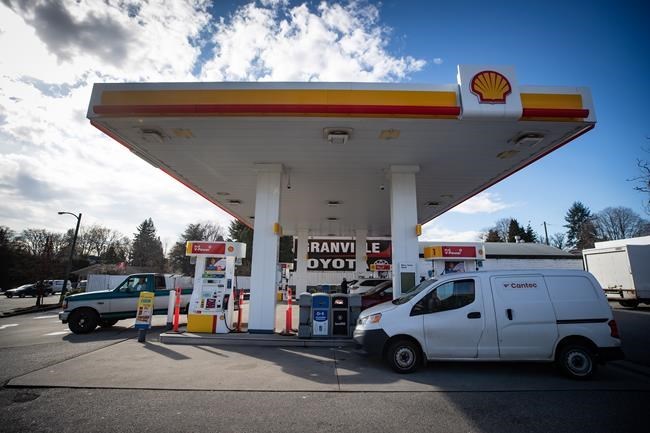CALGARY — The fossil fuel industry is increasingly under the microscope for its contribution to climate change, but the president of British oil giant Shell's Canadian subsidiary says oil and gas companies can't be held solely responsible for the pace of the global energy transition.
Shell Canada president Susannah Pierce made the comments Thursday in an interview in Calgary, where hundreds of executives and government officials from oil-producing nations around the world are arriving this weekend for the 24th World Petroleum Congress that kicks off Sunday.
The event, which was last held in Canada in 2000, is one of the world's premier oil-and-gas conferences. The theme of this year's forum, at which industry heavyweights such as Exxon Mobil CEO Darren Woods and Saudi Arabia's Minister of Energy are scheduled to speak, is the energy transition and the industry's net-zero greenhouse gas emission goals.
Pierce, who is fresh off being named Business Leader of the Year by the Canadian Chamber of Commerce this week, is also speaking at the congress.
While Shell has its own net-zero ambitions — the company is investing in electric vehicle charging, hydrogen, biofuels and wind and solar energy, in addition to traditional oil and gas — Pierce said the speed of global decarbonization is dependent on the entire economy transitioning, not just the fossil fuel sector.
"We're still a very largely fossil fuels-based economy, if you look across the various different sectors," she said.
"The speed at which we can move, is going to be the speed by which each of those components move together."
There has been renewed demand for traditional fossil fuels in the wake of Russia's invasion of Ukraine last year, which has prompted global concerns about energy security. Oil companies reaped record profits last year as commodity prices spiked to all-time highs.
In the wake of this surging demand, some companies have been criticized for emphasizing current profits over long-term climate progress. Shell Canada's parent company, for example, angered climate activists earlier this year by effectively abandoning its plan to cut global oil production by 1 to 2 per cent per year until the end of the decade.
The CEO of Suncor Energy Inc., another Canadian oil and gas company, has also come under fire from environmentalists and some politicians for comments he made suggesting that Suncor has been overly focused on the longer-term energy transition to low-emitting and renewable fuels.
Rich Kruger told analysts on a Suncor conference call that the company must focus on its present opportunities in the oilsands where it is better poised to "win."
While Pierce declined to comment on Kruger's statements specifically or the political reaction to them, she said oil and gas companies are providing a product that the global economy depends on.
"(If you are) a company that is servicing its customers that are still demanding a fossil fuel energy source, it’s very difficult to then not provide your customers with that energy they demand," she said.
Pierce said transitioning to a lower-carbon economy will require government incentives across the entire value chain, particularly in fossil fuel-intensive industries like cement and steel manufacturing, shipping and aviation.
She added that's why she's concerned about the federal government's mandated cap on emissions from the Canadian oil and gas sector, which is expected to be unveiled later this fall.
While oil and gas is Canada's heaviest-emitting sector, Pierce said a cap that penalizes the industry and potentially impacts its profitability will interfere with the its ability to invest in lower-carbon opportunities.
"I think as we look at decarbonization across the entire country, it needs to be consistent ... It needs to be a Pan-Canadian framework for decarbonization," she said.
"I don't think you should have an emissions cap on one sector by itself."
The government of Alberta, Canada's main oil-producing province, remains staunchly opposed to the emissions cap and has pledged to fight any such legislation.
However, two separate polls conducted by Leger and the Canadian Research Insights Council released earlier this week suggest most Albertans support some form of emissions cap on oil and gas production.
When asked if she was surprised by the polling results, Pierce said that while she believes a large number of Canadians want the energy sector to do its part in the fight against climate change, she thinks many are also opposed to legislated measures that could hurt the oilpatch.
"I think if the (poll) question were, 'if reducing our emissions means we need to shut in production, and possibly raise prices and potentially lose jobs, so now how do you feel about it?' It may have been a different answer."
This report by The Canadian Press was first published Sept. 15, 2023.
Amanda Stephenson, The Canadian Press

